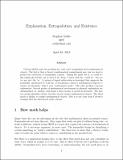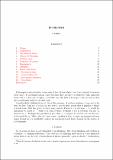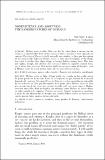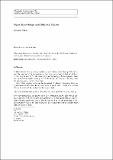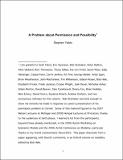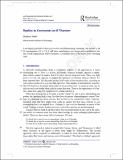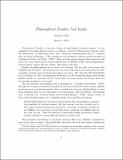Browsing by Author "Yablo, Stephen"
Now showing items 1-12 of 12
-
24.03 Relativism, Reason, and Reality, Spring 2005
Yablo, Stephen (2005-06)Are moral standards relative to cultures and/or moral frameworks? Are there incompatible or non-comparable ways of thinking about the world that are somehow equally good? Is science getting closer to the truth? Is ... -
24.221 Metaphysics, Fall 2005
Yablo, Stephen (2005-12)This course focuses on the study of basic metaphysical issues concerning existence, the mind-body problem, personal identity, and causation plus its implications for freedom. The course explores classical as well as ... -
Explanation, Extrapolation, and Existence
Yablo, Stephen (Oxford University Press, 2012-10)Mark Colyvan (2010) raises two problems for ‘easy road’ nominalism about mathematical objects. The first is that a theory’s mathematical commitments may run too deep to permit the extraction of nominalistic content. Taking ... -
If-Thenism
Yablo, Stephen (Informa UK Limited, 2017-04)An undemanding claim ϕ sometimes implies, or seems to, a more demanding one ψ. Some have posited, to explain this, a confusion between ϕ and ϕ*, an analogue of ϕ that does not imply ψ. If-thenists take ϕ* to be If ψ then ... -
Ifs, Ands, and Buts: An Incremental Truthmaker Semantics for Indicative Conditionals
Yablo, Stephen (Wiley-Blackwell, 2015-10)Indicative conditionals appear to lie on a continuum, with the subjective and information-based on one side, and the objective and fact-based on the other. Attempts to bring them all under the same theoretical umbrella ... -
Nonexistence and Aboutness: The Bandersnatches of Dubuque
Yablo, Stephen (Universidad Nacional Autonoma de Mexico, 2020-09)Holmes exists is false. How can this be, when there is no one for the sentence to misdescribe? Part of the answer is that a sentence's topic depends on context. The king of France is bald, normally unevaluable, is false ... -
Open knowledge and changing the subject
Yablo, Stephen (Springer Netherlands, 2016-08)Knowledge is closed under (known) implication, according to standard theories. Orthodoxy can allow, though, that apparent counterexamples to closure exist, much as Kripkeans recognize the existence of illusions of possibility ... -
Parts and differences
Yablo, Stephen (Springer Netherlands, 2015-01)Part/whole is said in many ways: the leg is part of the table, the subset is part of the set, rectangularity is part of squareness, and so on. Do the various flavors of part/whole have anything in common? They may be partial ... -
A Problem about Permission and Possibility
Yablo, Stephen (Oxford University Press (OUP), 2011-06)This chapter explores the prospects for a unified theory of deontic and (socalled) epistemic modality. A theory of deontic modality needs to solve the puzzles raised by David Lewis in 'A Puzzle About Permission'. In ... -
Replies to Comments on If-Thenism
Yablo, Stephen (Informa UK Limited, 2017)I am hugely grateful for these provocative and illuminating comments. My thanks to all N commentators. I will have something to say about each contribution, but the overall organization will be thematic. A reminder first ... -
Reply to Fine on Aboutness
Yablo, Stephen (Springer Netherlands, 2017-05)A reply to Fine’s critique of Aboutness. Fine contrasts two notions of truthmaker, and more generally two notions of “state.” One is algebraic; states are sui generis entities grasped primarily through the conditions they ... -
Review of Philosophical Troubles: Collected Papers, Volume 1
Yablo, Stephen (JSTOR, 2013-04)Philosophical Troubles is the first volume of Saul Kripke’s collected papers. It was originally to be called Bandersnatches in Dubuque, and Other Philosophical Troubles, after the observation, of which more later, that ...
